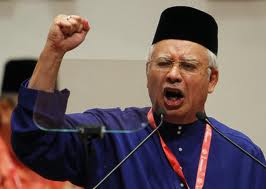PM urges Muslim nations to change to enable younger generation to grow
HAVING elevated Generation Y as Umno’s key agenda at the party’s general assembly last week, Prime Minister Datuk Seri Najib Tun Razak yesterday urged Muslim countries to embrace changes and capitalise on its greatest resource, which is the youth.He said the youth should be seen as an asset, and not a liability, “an untapped resource to allow the countries to develop and modernise”.
“We must place our confidence in Muslim youth as full economic participants, as consumers, employees and entrepreneurs.”We must not be afraid to encourage change in institutions which stifle young people’s opportunities in reforming public services, supporting appointment by merit and remaining ever vigilant against corruption,” he said in his keynote address when opening the World Islamic Economic Forum (WIEF), here, yesterday.
Najib Tun Razak, who is also finance minister, said it was up to the leaders to show leadership and build economies that were prepared for the future.He said Muslim economies must be willing to confront old assumptions and embrace new technologies, to open up economies and reform their politics, which would not always be easy with challenges and uncertainties.
Reforms, he said, were necessary and history had shown that the periods of greatest Islamic influence were the most intellectually open.Najib said youth formed a considerable percentage of the demographic in many Muslim countries now, and this was likened to something called the “youth bulge”.
“In 2010, 60 per cent of Muslims were under the age of 30. By 2030, Muslims will make up 26 per cent of the world population, but 30 per cent of this will be youth,” he said.”Muslim youth want economic opportunities. We must build sustainable economies, with education and economic reforms that allow our young people to pursue their ambitions.”
On the Arab awakening, Najib said many young people could not see the opportunities and felt that they had no control over their lives or a stake in their nation.”Amid the global gloom, developing Muslim countries continue to bear a heavy burden. Many are at the receiving end of policy decisions, with little or no power to influence the global economic agenda.
“Such pessimism can lead to disengagement, radicalism or emigration. While political freedom is important, it is economic opportunity that young people value most.”We are losing some of our young people to apathy and extremism.”
Najib warned against the danger of having a generation that missed out on gaining employment or useful skills.He said there were “toxic” examples in the 2010 statistics for unemployment in the Middle East, which stood at 25 per cent, and North Africa at 24 per cent.
He also said from 1970 to 2000, eight out of 10 countries experienced new civil conflict and had populations where 60 per cent were under 30 — a demographic figure similar to the Muslim world today.
Muslim economies, he said, must also understand that the second great change in young people’s lives was technology. He pointed out that 21 years ago, there were no websites. But today, he said, with more than half a billion websites in cyber space, the Internet had transformed from a tiny scientific community into one of the most potent development tools the world had ever known.
More than 2,000 delegates from 80 countries are attending the three-day WIEF.Among the heads of government are Union of Comoros president Dr Ikililou Dhoinine; Singapore Deputy Prime Minister and Minister of Finance Tharman Shanmugaratnam; special representative for the Qatar prime minister, Dr Hussain Al Abdullah; special representative for the president of Pakistan, Syed Naveed Qamar; Islamic Development Bank president Tan Sri Dr Ahmad Mohamed Ali and Moro Islamic Liberation Front chairman Al Haj Murad Ebrahim. Additional reporting by Roziana Hamsawi


Pingback: Najib Tun Razak Pledge To Increase Indians’ Economic Equity In The Country To 3% « Latest News
Pingback: Najib pledges Papar-Lok Kawi road upgrade if BN wins | Support Najib Tun Razak
Pingback: Najib Tun Razak Pledge To Increase Indians’ Economic Equity In The Country To 3% | Support Najib Tun Razak
Pingback: NO POLITICS: Najib successfully wooed investors at World Economic Forum | najibtunrajaksuccess
Pingback: Don’t throw 50 years of hard work away, says Najib Razak | Show Support to Najib Tun Razak